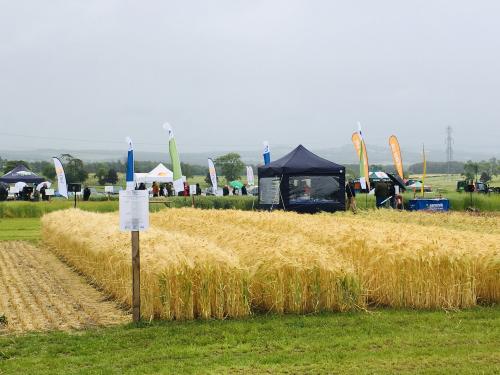The ever popular ‘Arable Conversations’ are at the heart of this year’s programme will provide a forum for lively discussion about current issues in the arable industry. The morning conversation is chaired by Elizabeth Massie, a farmer in East Lothian, who will steer a panel of farmers and agronomists to identify which farming practices will create resilience in Scottish arable systems. The panel and audience will discuss soil and crop management practices that are starting to show benefits for coping with weather extremes and associated changes in pests and diseases. Panel representation from FarmStrong Scotland will ensure the discussion goes beyond agricultural practice to consider what else is needed for greater social resilience and wellbeing.
In the afternoon, a second arable conversation will explore emerging markets in Natural Capital, guided by Clive Mitchell from Nature Scot as the chair. Agriculture depends on nature, but how can farmers quantify natural capital on their land? And if this nature has a value, how will they be rewarded for preserving and improving their natural capital? To answer these questions, the panel brings together people from different perspectives, in farming, advice, research and policy, to explore with the audience how these markets might operate in the future.
The arable conversations will top-and-tail an exciting new element in the Arable Scotland programme - a series of short seminars in the late morning slot. Prof Derek Stewart will explain how opportunities are opening for new crops and markets as farming adapts to the changing climate and regulatory landscape. He will highlight applied research and market routes for expanding minor crops, and introducing new fibre, food, and medicinal crops.
Staying on the theme of novel crops, our annual sponsor KWS will present a video clip highlighting their focus on breeding for resilience in cereal crops, and how this is particularly important for their Scottish market.
Dr Kenneth Loades will summarise new data on what makes Scottish soils resilient to extreme conditions and how this varies with soil type. He will highlight the importance of long-term management practices to build soil resilience, and why farmers need to have a range of management options at their disposal, so they can select ones that are most suited to their local conditions.
For those wanting to know more about the Tay Cities Region Deal-funded work at the Hutton’s site at Invergowrie and the initiatives it hosts; Prof Robbie Waugh’s seminar will give an insight through his talk on the International Barley Hub (IBH) which is convening to the world’s top scientists in barley to deliver step changes in barley research, production and use, and resilience across the supply and value chains. Prof Waugh will explain how the IBH is developing the next generation of barley scientists working at the research-industry interface through the BARiTONE Industrial Training Network PhD program. This element of the programme will be chaired by David Webster, the Chief Executive of LEAF UK, who is travelling to Scotland to open the event and hopefully these seminars promise a stimulating preview into the future of arable farming.
Finally, Frédéric Thomas, one of the founders of BASE-France and a pioneer of conservation agriculture, will help the audience to better understand the challenges of regenerative practices.
With something for everyone, Arable Scotland offers a unique platform for knowledge exchange and inspiration, between farmers, agronomists, suppliers, processors and scientists. Supported and championed by The James Hutton Institute in partnership with the Agriculture and Horticulture Development Board (AHDB), Arable Scotland’s mission is to facilitate the adoption of practices that enhance sustainability and resilience in farming.
We thank our long-term sponsors, SEFARI Gateway, the Scottish Society for Crop Research and Scotland’s Rural College, and our annual sponsors for their support.
Be part of this forward-looking event by joining us on 2nd July at Balruddery Farm. For further details and to register attendance, visit: www.arablescotland.org.uk.
Alison Karley (Arable Scotland Committee Chair), The James Hutton Institute, Dundee.
Image: Michelle Wilson Chalmers
